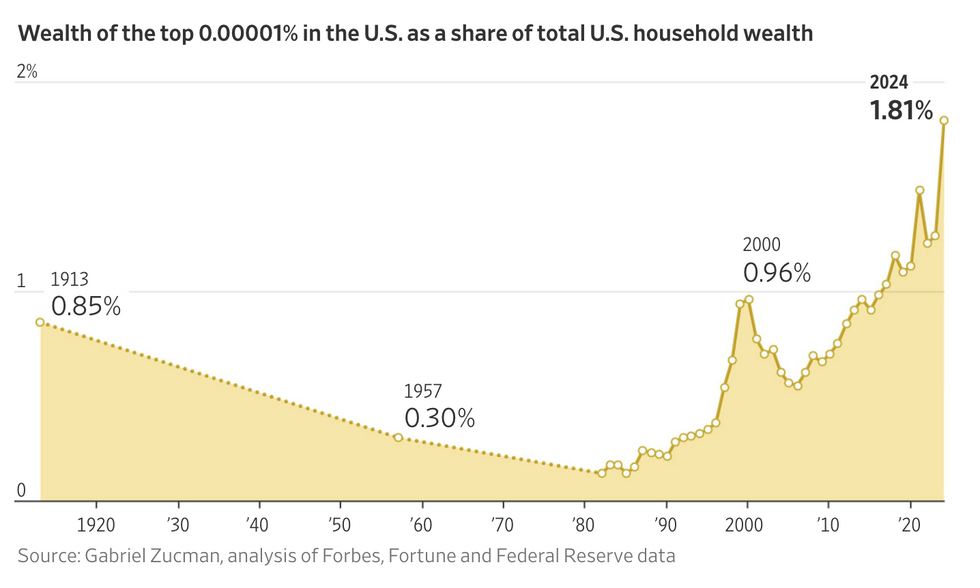A new analysis by a leading chronicler of the United States' exploding inequality shows that the 19 richest American households added $1 trillion to their collective fortunes last year and saw their share of the nation's wealth jump at a record-shattering pace.
The analysis by Gabriel Zucman, a professor of economics at the University of California, Berkeley, estimates that the 19 wealthiest U.S. families now control 1.8%—or $2.6 trillion—of the nation's total household wealth.
In 2024, those ultrarich households saw the largest single-year wealth increase on record.
The Wall Street Journal noted in its Wednesday write-up of Zucman's analysis—based on data from Forbes, Fortune, and the Federal Reserve—that the families in his "research on the top 0.00001% in the U.S. are worth at least $45 billion per household and include Elon Musk, Jeff Bezos, Mark Zuckerberg, Bill Gates, Warren Buffett, and private-equity investor Stephen Schwarzman."
Their wealth is largely tied up in the U.S. stock market, which rose more than 23% in 2024. The richest 10% of U.S. households control 93% of stock market wealth, according to the Federal Reserve.
 (Source: Gabriel Zucman via The Wall Street Journal)
(Source: Gabriel Zucman via The Wall Street Journal)
Zucman, whose analysis dates back to 1913, told the Journal that the U.S. has recently seen a "dramatic acceleration in the rise of the share of wealth owned by the truly superwealthy"—a trend that would continue if President Donald Trump and the Republican-controlled Congress pass tax legislation largely benefiting the rich.
"If there's one glimmer of hope it is this," Zucman wrote on social media last month, pointing to a packed "Fighting Oligarchy" rally held in Denver by Sen. Bernie Sanders (I-Vt.) and Rep. Alexandria Ocasio-Cortez (D-N.Y.).
"There is a strong anti-oligarchic current in America, and it has a formidable champion," Zucman added. "Fight!"
The Journal reported Wednesday that "a household in the top 0.1%—roughly 133,000 households each worth at least $46.3 million—accumulated an average of $3.4 million a year since the third quarter of 1990, in 2024 dollars."
"In comparison, the wealth of the rest of the top 1%—roughly 1.2 million households each worth at least $11.2 million—grew by an average of $450,000 per household, per year," the Journal added.
Meanwhile, families at the bottom of the U.S. income and wealth distribution have struggled due to what the Economic Policy Institute recently described as "policy-induced wage suppression."
A February working paper by the think tank RAND estimated that the bottom 90% of U.S. workers would have earned $3.9 trillion more in 2023 alone had the income distribution been more even rather than flowing disproportionately to the top.
"Since 1975, nearly $80 trillion in wealth has been redistributed from the bottom 90% of Americans to the top 1%," Sanders said last month in response to the paper. "The massive income and wealth inequality in America today is not only morally unjust, it is profoundly damaging to our democracy."





 (Source: Gabriel Zucman via The Wall Street Journal)
(Source: Gabriel Zucman via The Wall Street Journal)